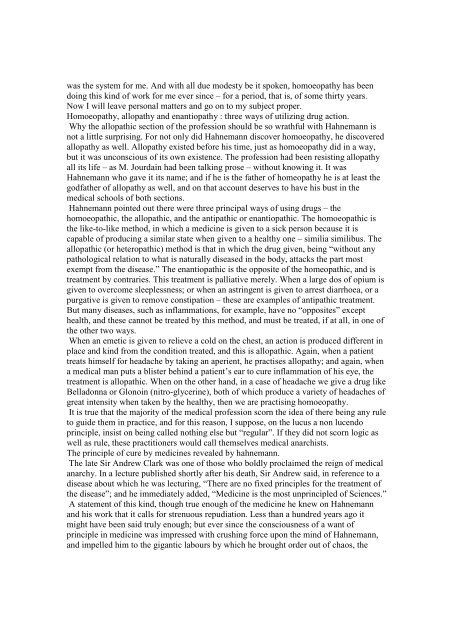CLARKE JH, Homoeopathy Explained - Classical Homeopathy Online
CLARKE JH, Homoeopathy Explained - Classical Homeopathy Online
CLARKE JH, Homoeopathy Explained - Classical Homeopathy Online
Create successful ePaper yourself
Turn your PDF publications into a flip-book with our unique Google optimized e-Paper software.
was the system for me. And with all due modesty be it spoken, homoeopathy has been<br />
doing this kind of work for me ever since – for a period, that is, of some thirty years.<br />
Now I will leave personal matters and go on to my subject proper.<br />
<strong>Homoeopathy</strong>, allopathy and enantiopathy : three ways of utilizing drug action.<br />
Why the allopathic section of the profession should be so wrathful with Hahnemann is<br />
not a little surprising. For not only did Hahnemann discover homoeopathy, he discovered<br />
allopathy as well. Allopathy existed before his time, just as homoeopathy did in a way,<br />
but it was unconscious of its own existence. The profession had been resisting allopathy<br />
all its life – as M. Jourdain had been talking prose – without knowing it. It was<br />
Hahnemann who gave it its name; and if he is the father of homeopathy he is at least the<br />
godfather of allopathy as well, and on that account deserves to have his bust in the<br />
medical schools of both sections.<br />
Hahnemann pointed out there were three principal ways of using drugs – the<br />
homoeopathic, the allopathic, and the antipathic or enantiopathic. The homoeopathic is<br />
the like-to-like method, in which a medicine is given to a sick person because it is<br />
capable of producing a similar state when given to a healthy one – similia similibus. The<br />
allopathic (or heteropathic) method is that in which the drug given, being “without any<br />
pathological relation to what is naturally diseased in the body, attacks the part most<br />
exempt from the disease.” The enantiopathic is the opposite of the homeopathic, and is<br />
treatment by contraries. This treatment is palliative merely. When a large dos of opium is<br />
given to overcome sleeplessness; or when an astringent is given to arrest diarrhoea, or a<br />
purgative is given to remove constipation – these are examples of antipathic treatment.<br />
But many diseases, such as inflammations, for example, have no “opposites” except<br />
health, and these cannot be treated by this method, and must be treated, if at all, in one of<br />
the other two ways.<br />
When an emetic is given to relieve a cold on the chest, an action is produced different in<br />
place and kind from the condition treated, and this is allopathic. Again, when a patient<br />
treats himself for headache by taking an aperient, he practises allopathy; and again, when<br />
a medical man puts a blister behind a patient’s ear to cure inflammation of his eye, the<br />
treatment is allopathic. When on the other hand, in a case of headache we give a drug like<br />
Belladonna or Glonoin (nitro-glycerine), both of which produce a variety of headaches of<br />
great intensity when taken by the healthy, then we are practising homoeopathy.<br />
It is true that the majority of the medical profession scorn the idea of there being any rule<br />
to guide them in practice, and for this reason, I suppose, on the lucus a non lucendo<br />
principle, insist on being called nothing else but “regular”. If they did not scorn logic as<br />
well as rule, these practitioners would call themselves medical anarchists.<br />
The principle of cure by medicines revealed by hahnemann.<br />
The late Sir Andrew Clark was one of those who boldly proclaimed the reign of medical<br />
anarchy. In a lecture published shortly after his death, Sir Andrew said, in reference to a<br />
disease about which he was lecturing, “There are no fixed principles for the treatment of<br />
the disease”; and he immediately added, “Medicine is the most unprincipled of Sciences.”<br />
A statement of this kind, though true enough of the medicine he knew on Hahnemann<br />
and his work that it calls for strenuous repudiation. Less than a hundred years ago it<br />
might have been said truly enough; but ever since the consciousness of a want of<br />
principle in medicine was impressed with crushing force upon the mind of Hahnemann,<br />
and impelled him to the gigantic labours by which he brought order out of chaos, the
















